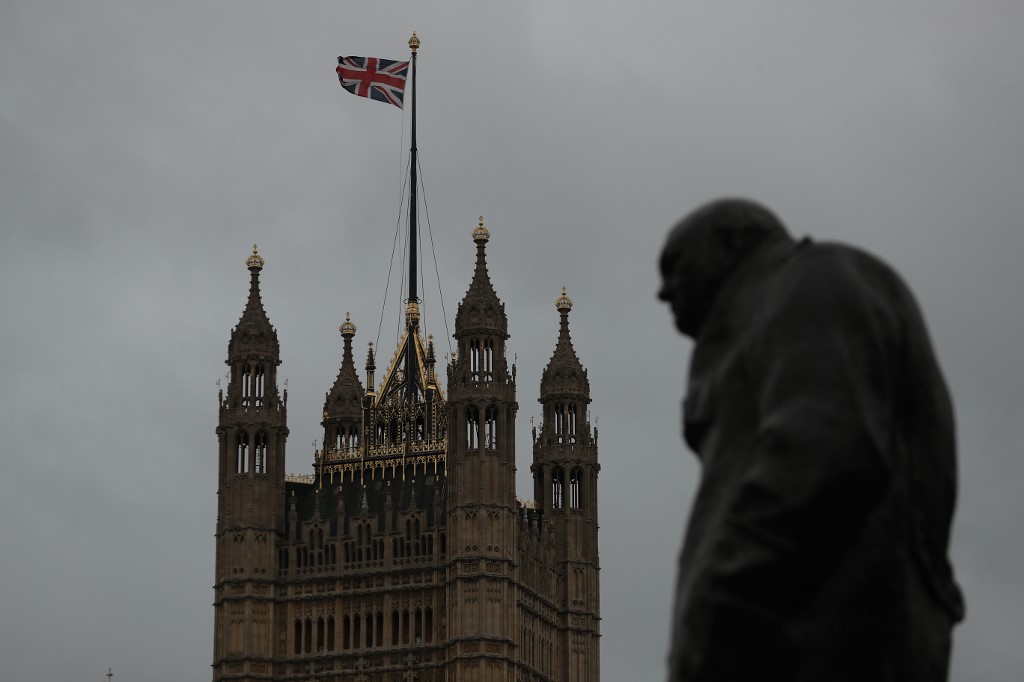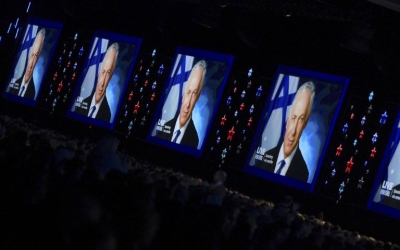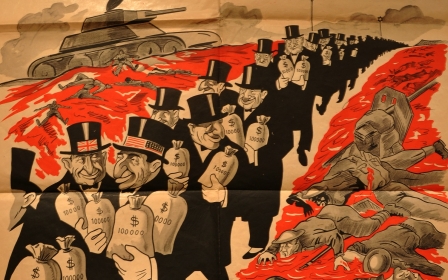Pro-Zionism and antisemitism are inseparable, and always have been

In recent years, amid the increasing success of the boycott, divestment and sanctions (BDS) movement, pro-Israel voices have expressed much concern about the “antisemitic” motives of all movements opposing Israeli settler-colonialism, state racism and military occupation.
The pro-Israel accusers want to correct the record, asserting that antisemitism is not a right-wing ideology anymore, but rather one that is endemic on the left.
This is not a new strategy, but an old Israeli state-sponsored scheme to attack Palestinians and defame critics of Israel in the US and European left who began to level criticisms against Israel after 1967.
Suppressing Palestinians
In the two decades between the establishment of the Israeli settler colony and its 1967 invasions of Syria, Jordan and Egypt, the white US and European left was enchanted with the country, defending it at every turn against the claims of the expelled and suppressed indigenous Palestinians whose lands and livelihoods it had usurped.
However, after the 1967 invasions, the rise of US civil rights and liberation movements, and student uprisings in France and elsewhere, the situation began to change. A minority of the white left in the US and Western Europe began to voice criticisms of Israel for the first time, alarming the Israeli leadership and pro-Zionist circles in the US and Western Europe.
Eban's identification of Israeli colonial and racist policies with Jewish tradition was part and parcel of Zionism’s implicating all Jews in Israel’s actions
While more recently, the Israeli government has devoted huge financial resources to challenge such criticism - including $72m to combat BDS - its response in 1972 was less drastic, if not less effective. At an annual conference in Israel sponsored by the American Jewish Congress, former Israeli foreign minister Abba Eban laid out the new strategy: “Let there be no mistake: The New Left is the author and the progenitor of the new antisemitism … the distinction between antisemitism and anti-Zionism is not a distinction at all. Anti-Zionism is merely the new antisemitism.”
If gentile critics were castigated as anti-Semites, Eban described two US Jewish critics (Noam Chomsky and I F Stone) as suffering from a complex of “guilt about Jewish survival”. Their values and ideology - meaning anti-colonialism and anti-racism - “are in conflict and collision with our own world of Jewish values”.
Eban's identification of Israeli colonial and racist policies with Jewish tradition was part and parcel of Zionism’s implicating all Jews in Israel’s actions and ideals.
An old alliance
The strategy of equating anti-Zionism with antisemitism is, in fact, a strategy to conceal and distract from the very real, old antisemitism that was always an ally of the Zionist movement - an alliance that goes back to the 1890s and continues to this very day.
The founder of Zionism, Theodor Herzl, explained in his 1896 pamphlet The Jewish State that the Zionist project shares with anti-Semites a desire to empty Europe of its Jews in order to send them to a colonial territory outside Europe.
He famously declared that “the governments of all countries scourged by antisemitism will be keenly interested in assisting us to obtain the sovereignty we want” and that “not only poor Jews” would contribute to an immigration fund for European Jews, but also Christians who wanted to get rid of them”.
He added in his diaries: “The anti-Semites will become our most dependable friends, the antisemitic countries our allies.”
When a surge of antisemitism arose in Britain at the beginning of the 20th century in relation to admitting Jewish refugees fleeing Russian pogroms, it was Herzl who counselled British antisemitic officials that supporting Zionist settler colonialism in Palestine would spare them from admitting Jewish refugees into Britain.
Herzl’s British ally at the time was former colonial secretary, Joseph Chamberlain, who believed that “Jewish” money would aid British imperialism if Britain supported the Zionist project.
When former British prime minister Arthur Balfour shepherded the Aliens Act of 1905 through the House of Commons to ban Eastern European Jewish immigration, his concern was to save the country from the "undoubted evils" of Jewish immigration.
Like Chamberlain, Balfour had in mind another colonial destination for Jewish immigrants. The point is not that Balfour was first an anti-Semite and then became pro-Jewish when he issued the Balfour Declaration of 1917, but rather that his pro-Zionist views were mobilised by his antisemitism.
Churchill’s conflation
Winston Churchill is also declared by Zionists as yet another hero for the “Jewish people”. Churchill’s antisemitism was also legendary. He identified communism as a Jewish conspiracy to take over the world, and supported Zionism, which offered a settler-colonial solution to “the Jewish problem” that undercut communism.
One could ostensibly argue that, aside from Herzl’s own ideological pronouncements and opportunism, perhaps the early Zionists were weak and desperate, and had to ally themselves regrettably with the devil in order to realise their project, making them most forgiving of the antisemitism of their allies.
But this would be a difficult thing to argue, not only because the Israeli leadership today and its pro-Zionist allies in Europe and the US continue to celebrate figures such as Chamberlain, Balfour and Churchill, but also - and more importantly - because Israel’s leaders, like the pre-state Zionist leadership, have continued to ally the country with anti-Semites and white colonial settlers consistently since its establishment in 1948.
More than that, the country’s leaders, like pre-state Zionists, continue to ignore antisemitism when it comes from pro-Zionist forces, or at least from forces that are not anti-Zionist. Israeli silence, for example, on McCarthyist antisemitism in the 1950s US, which targeted Jews as communists and communists as Jews, in a way not unlike Churchill’s conflation, is but one example.
The Zionist movement chose to name its settler-colonial state “Israel”, the name the Torah accorded to Jacob, wherein the children of Israel become the “Jewish people”. This choice was not arbitrary. In naming its state this way, the Zionist movement conflated its settler-colonial project with all Jews, even when the majority of world Jewry did not support the movement and continues to refuse to live in Israel today.
Continuing Herzl’s legacy
If Zionism becomes another word for Judaism and Jews, and if Israel is the Jewish people - and not only “their” alleged state - all pro-Zionists would be, perforce, not antisemitic. Indeed, if classic antisemitism is racism against diaspora Jews, then the Zionist movement has nothing to worry about, as its declared aim was, and is, to end the Jewish diaspora.
This is why anti-Semites, if pro-Zionist, are considered by Israel and its supporters as pro-Jewish. As for those who oppose Zionism and are critical of the state of Israel, and who also oppose classic antisemitism that targets diaspora Jews, they are maligned as veritable “anti-Semites”.
Israel’s leaders are uncritical of white supremacist European and US movements with which Israel is allied, but they have also continued to ignore their antisemitism
What has been worryingly absent in the recent official US, European and British endorsements of the Israeli government’s equation of anti-Zionism with antisemitism is any mention of the endemic antisemitism of pro-Israel circles before and after 1967.
Eban’s concern about the “new antisemitism”, expectedly, was never expressed when dealing with pro-Israel and pro-Zionist anti-Semites.
Israel also supported Paraguayan dictator Alfredo Stroessner, who launched antisemitic campaigns against Paraguayan Jews who opposed him, but at the same time supported Israel, which provided him with weapons.
In addition, Israel allied itself with the Argentinian coup leaders in the late 1970s and 1980s and provided them with military aid, as they targeted Jewish dissidents whom they disappeared, tortured and killed.
A ‘verbal onslaught’
This was also the position of the Israeli government towards US evangelicals. Jerry Falwell, who founded the Moral Majority, a right-wing fundamentalist Christian organisation that would be the most powerful supporter of Israel on the Christian right, identified the antichrist as a Jew. Yet, when he died in 2007, Israeli leaders and heads of pro-Israel mainstream US Jewish organisations praised Falwell’s support of Israel, “despite” some “differences” they’d had with him.
If Eban was concerned about all gentile critics and a couple of Jewish intellectuals critical of Israel in 1972, by 2007, the pro-Zionist concern would be expanded to include the much larger number of US Jewish critics of Israel.
David Harris, the executive director of the American Jewish Committee, published an essay in which he stated: “Perhaps the most surprising - and distressing - feature of this new trend is the very public participation of some Jews in the verbal onslaught against Zionism and the Jewish state.” He added that those who oppose Israel’s right to exist, “whether Jew or gentile, must be confronted”.
In the more recent past, not only have Israel’s leaders been uncritical of right-wing, white supremacist European and US movements with which Israel is allied, but they have also continued to ignore their antisemitism, which - as expected - is forgiven because of their support for Israel and Zionism.
The story has repeated itself recently in Israel’s support for Ukrainian antisemites, Hungarian and Polish antisemites, and even German and Austrian antisemites. This has been important for the recent Israeli push to criminalise anti-Israeli criticism in the EU and US.
Arming neo-Nazi militias
This began with the International Holocaust Remembrance Alliance’s adoption of a working definition of antisemitism in 2016, which included “manifestations … targeting of the state of Israel, conceived as a Jewish collectivity”. When the EU adopted a measure last December defining antisemitism as including anti-Zionist positions and positions critical of Israel, it was the right-wing Austrian government, which includes members of a neo-Nazi party, that pushed for its adoption.
In Hungary, Israeli Prime Minister Benjamin Netanyahu went so far as to rebuke the Israeli ambassador in Budapest for a statement expressing mild concern over Orban’s anti-Jewish racism. On Netanyahu’s orders, the Israeli foreign ministry retracted the statement.
In the Ukraine, Israel is arming neo-Nazi militias, especially the Azov Battalion. Azov leader Andriy Biletsky declared in 2014 that “the historic mission of our nation … is to lead the white races of the world in a final crusade for their survival. A crusade against the Semite-led untermenschen.”
In Germany, the party Alternative for Germany (AFD) is a far-right organisation that won almost 100 seats in Germany’s general election last September and whose critics say it promotes neo-Nazi ideas, alarmed the country’s Jewish community. Alternative for Germany also supports Israel; deputy leader Beatrix von Storch, granddaughter of Hitler’s last finance minister, told The Jerusalem Report that “Israel could be a role model for Germany” as a country that “makes efforts to preserve its unique culture and traditions”.
This echoes the line of US neo-Nazi demagogue Richard Spencer, who referred to his mission as a “sort of white Zionism”. Israel, he added, is “the most important and perhaps most revolutionary ethno-state, and it’s one that I turn to for guidance”. Israel and its leaders have not responded to his declarations.
Synagogue attacks
When US President Donald Trump told US Jews at a White House Hanukkah party in December 2018 that his vice president had great affection for “your country”, Israel did not object - nor did it object to Trump telling a group of US Jews a few weeks ago that Netanyahu is “your prime minister.”
The support for Israel among white supremacist US groups goes hand-in-hand with their antisemitic propaganda, whether in Charlottesville, or last October in Pittsburgh when a white supremacist massacred 11 Jewish worshippers in a synagogue, or last month in San Diego, with yet another attack on a synagogue killing one person and injuring several.
The support for Israel among white supremacist US groups goes hand-in-hand with their antisemitic propaganda
Pro-Zionist right-wing antisemitism continues to threaten Jewish lives in the US and Europe. While progressive US and European Jews, Christians, Muslims, and people of all faiths have joined anti-Zionist movements, and movements that oppose Israeli racist and settler-colonial policies, and are committed to combatting anti-Semitism, pro-Israeli Jews and gentiles are part of pro-Zionist movements whose anti-Semitism threatens the physical existence of US and European Jews.
It is high time that pro-Zionist US and European Jewish organisations issue special reports on pro-Zionist antisemitism, as they continue to do when they target anti-Zionists. Antisemitism and anti-Zionism are not one and the same, as Eban, the Israeli government and their supporters would like us to believe; in fact, anti-Semitism, pro-Zionism, racism and pro-colonialism are inseparable companions.
Celebrating war crimes
Indeed, pro-Zionism is the only respectable form of antisemitism today - one that is welcomed by the Israeli government and pro-Zionists everywhere as a boon to the state of Israel.
When pro-Zionists celebrate Israeli invasions and war crimes as a Jewish achievement, Israel and its supporters cheer them on - but when anti-Zionists attack Israeli crimes and invasions as the crimes of the Israeli government, and decidedly not the crimes of the Jewish people, it is Israel and its pro-Zionist supporters who call them antisemites.
Israel defines itself as the “Jewish state” and insists that stealing the homeland of the Palestinian people, colonising their lands, expelling them and bombing them are all carried out in the name of the “Jewish people”. It claims that what it does is mandated by its “Jewish” ethics and, after all this, advances the claim that those who condemn Israel are condemning Jews.
Ironically, it is the majority of Israel’s critics, in contrast to the majority of its supporters, who reject Israeli claims that Israel represents all Jews, and who insist that Israeli racist laws and colonial policies represent the Israeli government and not the Jewish people.
When Palestinians resist Israeli colonialism and racism, they are not resisting the “Jewish” character of Israel, but its racist and colonial nature, institutions, laws and practices.
The pro-Zionist conflation of anti-Zionism with antisemitism is not only a false equation to fight critics of Israel; it is first and foremost the justification for pro-Zionist and pro-Israeli antisemitism. Those concerned with the lives and safety of diaspora Jews and the Palestinian people should respond to this propaganda campaign by declaring with confidence that pro-Zionism is antisemitism, and that no distinction should be made between the two.
The views expressed in this article belong to the author and do not necessarily reflect the editorial policy of Middle East Eye.
Middle East Eye propose une couverture et une analyse indépendantes et incomparables du Moyen-Orient, de l’Afrique du Nord et d’autres régions du monde. Pour en savoir plus sur la reprise de ce contenu et les frais qui s’appliquent, veuillez remplir ce formulaire [en anglais]. Pour en savoir plus sur MEE, cliquez ici [en anglais].










